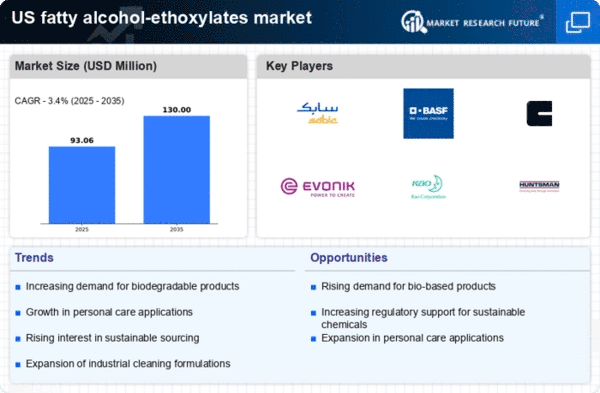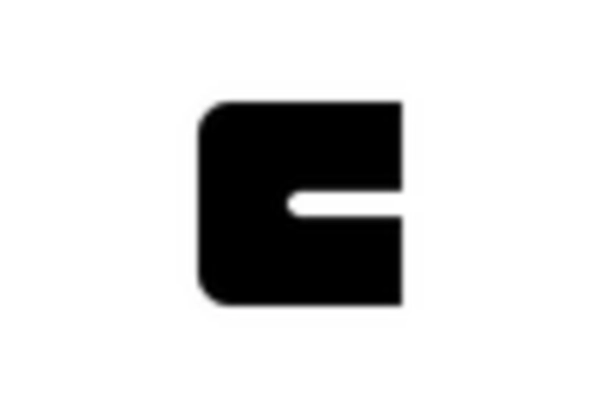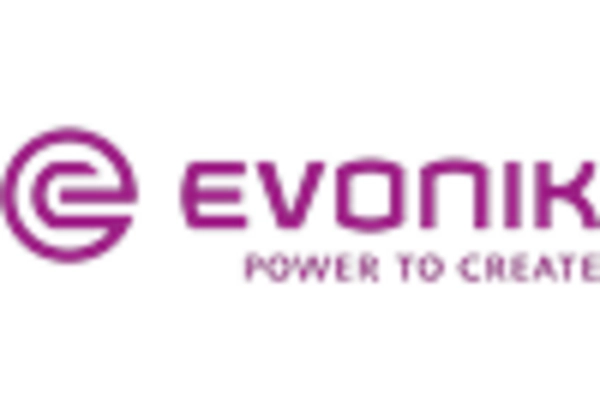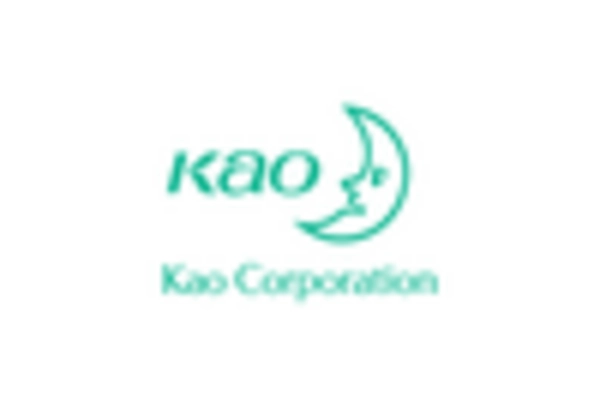Growth in End-Use Industries
The fatty alcohol-ethoxylates market is experiencing substantial growth due to the expansion of end-use industries such as personal care, textiles, and agriculture. In the personal care sector, fatty alcohol-ethoxylates are utilized as surfactants and emulsifiers, contributing to the formulation of shampoos, lotions, and other cosmetic products. The textile industry also employs these compounds for their wetting and dispersing properties, enhancing fabric treatments. Furthermore, the agricultural sector uses fatty alcohol-ethoxylates in pesticide formulations, improving their effectiveness. The increasing demand from these industries is expected to propel the market forward, with estimates suggesting a market value exceeding $1 billion by 2027. This growth underscores the versatility of fatty alcohol-ethoxylates and their critical role in various applications, thereby solidifying their importance in the market.
Consumer Awareness and Education
The growing awareness and education among consumers regarding the benefits of using fatty alcohol-ethoxylates is a key driver for the market. As consumers become more informed about the ingredients in their personal care and household products, they are increasingly seeking out formulations that contain safer and more effective components. This trend is particularly evident in the personal care industry, where consumers are scrutinizing product labels and opting for items that feature fatty alcohol-ethoxylates due to their mildness and efficacy. The rise of social media and online platforms has further amplified this awareness, enabling consumers to share information and experiences related to product performance. Consequently, manufacturers are compelled to highlight the advantages of fatty alcohol-ethoxylates in their marketing strategies, which is likely to enhance market growth and foster a more informed consumer base.
Rising Demand for Eco-Friendly Products
The increasing consumer preference for eco-friendly and sustainable products is driving growth in the fatty alcohol-ethoxylates market. As consumers become more environmentally conscious, manufacturers are responding by developing products that align with these values. This shift is evident in various sectors, including personal care and household cleaning, where fatty alcohol-ethoxylates are favored for their biodegradable properties. The market is projected to witness a compound annual growth rate (CAGR) of approximately 5% over the next few years, reflecting the growing inclination towards sustainable alternatives. Companies are investing in research and development to enhance the eco-friendliness of their fatty alcohol-ethoxylates, which is likely to further boost market demand. This trend indicates a significant transformation in consumer behavior, compelling businesses to adapt their product offerings to meet the evolving expectations of environmentally aware consumers.
Technological Innovations in Production
Technological advancements in the production processes of fatty alcohol-ethoxylates are significantly influencing the market landscape. Innovations such as improved catalytic processes and the development of more efficient ethoxylation methods are enhancing production efficiency and reducing costs. These advancements not only streamline manufacturing but also contribute to the sustainability of the fatty alcohol-ethoxylates market by minimizing waste and energy consumption. As companies adopt these new technologies, they are likely to achieve higher profit margins and better product quality, which could attract more investments into the sector. The ongoing research into alternative feedstocks, including bio-based sources, further indicates a potential shift towards more sustainable production methods. This technological evolution is expected to play a pivotal role in shaping the future of the fatty alcohol-ethoxylates market.
Regulatory Support for Biodegradable Surfactants
Regulatory frameworks in the United States are increasingly favoring the use of biodegradable surfactants, which is beneficial for the fatty alcohol-ethoxylates market. Agencies such as the Environmental Protection Agency (EPA) are promoting the adoption of environmentally friendly chemicals, thereby encouraging manufacturers to shift towards more sustainable options. This regulatory support is likely to enhance the market appeal of fatty alcohol-ethoxylates, as they are recognized for their lower environmental impact compared to traditional surfactants. The alignment of industry practices with regulatory expectations may lead to increased market penetration and consumer acceptance. As regulations continue to evolve, companies that prioritize compliance and sustainability in their product offerings are expected to gain a competitive edge in the fatty alcohol-ethoxylates market.

















